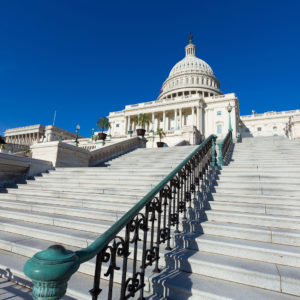Editor’s Note: For an alternative viewpoint, please see: Point: Increase the Public Debt at Your Peril
With the Republican tax cut projected to add $1.5 trillion to the national debt over the next decade, we are seeing a new round of fear-mongering over the debt. While this tax cut is a poor use of public funds, the whining over the debt and deficits is best ignored. It is easy to scare people with talk of multi-trillion dollar debts, but this is a politics of fear, not a basis for constructing reality-based policy.
There are three ways in which deficits or debt can be seen as a problem. First, large deficits can overheat the economy leading to high interest rates and/or high inflation. Second, a large debt can impose a significant interest burden on the government and implicitly on future taxpayers. The third way is that excessive indebtedness can cause a country to become uncreditworthy, making it difficult or impossible to finance the government. None of these issues plausibly apply to the United States at present.
The first point is the classic story in which large amounts of government borrowing pulls capital away from the private sector. This would be bad news because businesses and state and local governments would have to pay higher interest rates, which would reduce their investment. With less investment, we would see less productivity growth, which would mean that we would be poorer in the future.
There are times when excessive deficits may crowd out investment, but this is clearly not one of them. Interest rates are extraordinarily low. In fact, they are far lower than in the years at the end 1990s when we were running surpluses.
There also is no evidence that excessive spending has led to inflation. The Federal Reserve Board has been struggling for most of the last decade to raise an inflation rate it views as too low.
The second issue is that the debt service — the amount of interest that we pay on the debt each year — will impose a large burden requiring either higher taxes or cuts in other spending or some combination. There also is no basis for this concern at present.
The interest that the government pays on its debt each year comes to around 1.0 percent of GDP, after we subtract the amount that was paid to the Federal Reserve Board and then refunded back to the Treasury. By comparison, the interest burden was more than 3.0 percent of GDP at the start of the 1990s.
It is also worth noting that the much larger interest burden of the 1990s did not prevent us from having a very prosperous decade. In other words, there is a long way to go before we face any serious problem by this measure.
Finally, there is the argument that we could end up in the same situation as Greece was in a few years back, where no one wants to lend money to the U.S. government. There are two major reasons the United States will not end up like Greece.
First, we borrow in our own currency. The U.S. prints dollars; we don’t have to worry about being able to borrow them. By contrast, Greece borrowed in euros, which it did not print.
This brings up the second point; we could print so much money that we face hyperinflation, like Zimbabwe did in the last decade. In principle, that could happen, but the problem in that case would be having a weak economy, not having a large debt. As long as the U.S. economy remains strong and grows at a respectable pace, we will never end up like Zimbabwe.
If we need proof of this fact, we need only look at Japan. The country has a debt that is two-and-a-half times as large as the U.S. debt relative to the size of its economy. Nonetheless, it can borrow long-term at a near zero interest rate. Its inflation rate has also been near zero as the government has been desperately trying to increase inflation for the last two decades.
In short, the country has many real problems. Tens of millions of young people struggle to pay for college. Young parents struggle to pay for quality child care and tens of millions of people have inadequate health care insurance.
These are all issues that deserve our attention. The federal debt is just a huge distraction.

